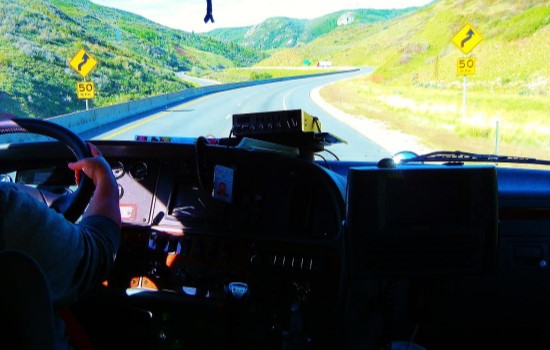Be it bullock carts, motorized trucks, or buses, they needed a human being to steer the vehicle, viz., a driver. Driverless vehicles are still in the beta stage across the globe even today. So they are critical for survival. Yet, drivers never receive proper treatment, that is to say, no respect. Why so?
 Business Monitor/By Ramesh Kumar
Business Monitor/By Ramesh Kumar
First, let us understand “respect”. आदर, as they say in Hindi. Or इज़्ज़त in Urdu. There are several ways to explain it. One, for instance, says, “the feeling that you have when you admire or have a high opinion of somebody/something.” Another defines it as “polite behaviour or care towards somebody/something you think is important.” My favorite definition is “treating others same way how you want to be treated.”
It is no secret that truck drivers never get the respect they deserve. Why do they deserve it? Because they enable each one of us live and lead a relatively carefree life. Imagine for a while your existence: food, shelter, health, and wealth. Who do we owe it to? Of course, parents who earn. But money has no meaning if it cannot be “bartered” for goods and services because one cannot “consume” money per se. Barter did the trick in the pre-currency saga, and the advent of currency in gold, silver, and animal skin took over.
Despite the clarion call to become self-sufficient at the village level by Father of the Nation Mohandas Karamchand Gandhi in the run-up to the Indian Independence a century ago, we ignored it. The concentration of manufacturing in select pockets of the vast country necessitated the movement of all goods to the nooks and corners. How was it done? Bullock carts and or horse-drawn carriages on unmade kaccha mud paths for decades. Have we forgotten that the Indian space program was enabled by bullock carts moving even mission-critical items? We have come a long way since then. National and State Highways and Expressways are part of our common lexicon.
Critical For Survival
Be it bullock carts, motorized trucks, or buses, they needed a human being to steer the vehicle, viz., a driver. Driverless vehicles are still in the beta stage across the globe even today. So they are critical for survival. Yet, drivers never receive proper treatment, that is to say, no respect. Why so?
Part of the blame lies with those who seek respect. Drivers, yes. These critical lowest supply chain links allowed themselves to be treated shabbily. Before finding fault with the respect-seekers, let us examine other stakeholders’ behaviour in the transport ecosystem.
A common outburst among truck drivers is that “even the security guard at the factory or distribution centers (warehouses) treat us worse than the stray dogs.” They fume and fret. Significantly they draw attention that they “earn” more than them! Still, no respect. The reason for such misbehaviour or poor treatment is apparent: their appearance. Their dress sense.
Unlike the uniformed, booted, and capped security guards, drivers appear haggard. Clean look versus ugly or uncouth. One’s looks matter a lot in every society. Plus, security guards are better-educated: they can read and write because their job profile demands checking vehicle, cargo, and driver documents before permitting entry into the premises. On the other hand, drivers are less-educated or never go to school.
Battle At The Gate
Thus, despite the earning disparity, drivers lose the battle at the gate. Is it remediable? Sure, it does. A simple matter of a change of clothes and quick grooming: combing hair at the least. Their job of driving the cargo in poor ergonomically designed truck cabins and the dusty environment, they cannot wear better clothes. Unlike their counterparts in the matured economies, Indian truck cabins are not air-conditioned to make long-haul truck driving a comfortable journey. Still, that is no excuse to look shabby.
What next? Once they pass through the security guards, their next encounter is with the logistics team inside the manufacturing sites/distribution centers. In many companies, these are outsourced 3PL teams. The psyche of these white-collar “logistic facilitators” against the uniformed security guards at the gate is no different. Far more educated than the men guarding the gates and several notches about the angoota-chhaap (many cannot sign their names and prefer thumb impression) drivers.
Logistics professionals, in a way, share their status with drivers. Within the organization, despite serving a critical function, seldom recognized adequately. Marketing, Sales, and Finance teams hog all limelight. Logistics practitioners are poor third cousins, even those in the organization’s muster rolls. The less said about the outsourced 3PL, the better. Therefore, there is always the sense of being “left out.” Yes, the 3PL bosses may enjoy a better rapport with the organization’s top team, not down the line.
It is human nature to pass on such indirect snubs to those serving below. Drivers fit the slot because none are below the junior logistics professionals except the men behind the wheels. Given the pressure-cooker atmosphere in the current just-in-time or no-inventory regime, delivery delays cause heart attacks, and production disruption – or supply chain disruption – may lead to the 3PL team being pulled by the plant head in the case of manufacturing; and the distribution center boss for quick docking, unloading and stacking inbound items and pulling and pushing out in the shortest possible time. No jobs are easy these days, except perhaps herding cattle or sheep on the meadows!
Human Touch
Execution of timely delivery overwrites everything. Inbound drivers are rarely appreciated for their good work but berated for any delay. No smiles, no pleasantries. No logistics professional asks: “are you okay? any problems en route?” but “has the material reached?” Human touch is absent. Almost mechanical. A robot may handle humans better. At the end of the long tiresome journey, drivers facilitating the GDP growth in general and the said company’s top and bottom lines, there is no decent human interaction.
At times, these drivers waited outside the factory gates or distribution centers for long hours due to their arrival after the white-collar 3PL team had shut shop and gone home; they had slept inside the driver cabins and attended to their natural calls in the open space. Absence of adequate basic amenities for drivers. Once the gate opens and they gain entry, there is no semblance of decent human behaviour. So, respect is out of stock.
Even after gaining entry into the premises is no guarantee for quick loading or unloading of goods. Long waits and drivers have no access to the washroom even. Forget about access to food. No cooking allowed. Heartless. The end-user – read India Inc – ironically host or celebrate Drivers Day on September 17 every year, organised by the 3PL. Big speeches by the logistics head of the business enterprise followed by gifts to drivers chosen under random categories, free lunch in a tastefully decorated shamiana, and goodbye. Significantly, drivers and bosses don’t eat together, but in separate rooms/cubicles. Hypocrisy in full display.
Fleet Owners
Now, shift to the fleet owners. Do they respect drivers? Wrong question. They fear drivers is the truth. Does fear generate respect? Not necessarily. Fleet owners need drivers because they cannot drive all their vehicles. Therefore, a great dependency on drivers. Why fear? Because there is no proper employer-employee relationship between the two. Just verbal contractual obligation and compensation based on per kilometer driven. More one drives, more compensation. Simple logic.
Fleet owners operate through their white-collar subordinates. The selection of these staff is based on their willingness to accept a comparatively low salary and long working hours. Their mindset is more or less like that of the 3PL at factory sites and distribution centers. Better educated vis-a-vis drivers. They wield more power because they “settle” drivers’ accounts at the end of every round trip. Fleet owners never settle in full with drivers and ensure there is always a sizeable amount to be paid to drivers in their kitty to hedge against contingencies in the form of driver decamping with cargo or accident or some penalties, etc. Yes, a lot of trust deficit. So, where is the scope for respect?
Co-existence
Yet, they all co-exist out of necessity. Mutual dependence. Wages of outsourcing and lesser social concern and complex psyche of stakeholders.
Honestly, drivers have lost all hope of desiring respect from stakeholders. They stopped expecting respect. From a societal evolution point of view, it is undesirable. But all have learned to live with it. Chalta hai, chal ne do!
Such disrespect for fellow humans, specifically in the Indian social milieu where each of us is nothing but a tiny piece sliced out of the giant fabric, is inexplicable and defies any logic. Or is it that we are all hypocrites?
(Main/Featured picture from Pixabay has been used for illustrative purposes only)
Also read by the same author: Glued to steering wheels: Senior drivers haven’t vanished yet. But why? – THE NEWS PORTER
The author is a seasoned business and economic journalist. He can be reached at konsultramesh@gmail.com. In this column, ‘Business Monitor’, he presents a global perspective on happenings in the world of business, commerce, economics and trade. The views are the author’s own and The News Porter bears no responsibility for the same.












More Stories
When Rajesh Khanna left the shoot mid-way, told scribe, ‘I’m going for a screw’
Of the Northern Lights and an Adventure with Huskies in Swedish Lapland!
Sufiana Lived His Heart: A Daughter Reminisces